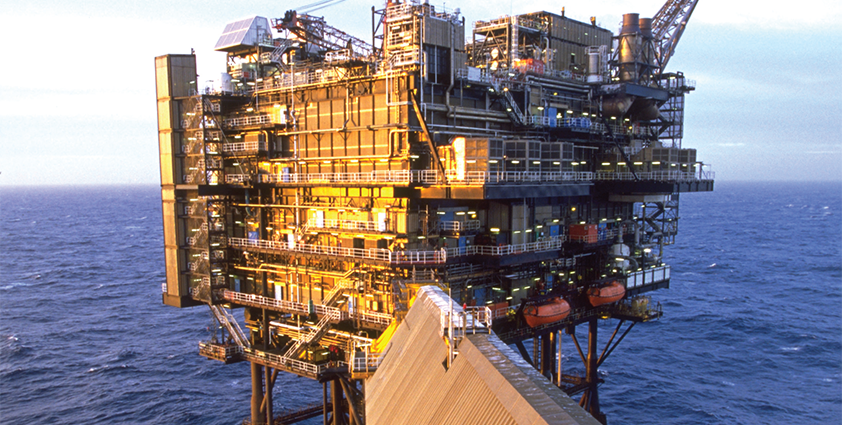
Total Laggan-Tormore
Total commitment
Total is one of France’s largest corporations and the world’s fifth largest publicly traded integrated international oil and gas company.
It is committed to meeting growing energy demand while consistently acting as a responsible corporate business, which is particularly important as Total is a world-class chemicals manufacturer, operating in more than 130 countries and with 96,950 employees.
Total’s strategy is based on a model for sustainable growth combining the acceptability of operations with a sustained, profitable investment program. The company’s main aims include expanding hydrocarbon exploration and production activities throughout the world, strengthening its position as one of the global leaders in the natural gas and LNG markets, and progressively expanding Total’s energy offerings by developing complementary next generation energy activities such as solar, biomass and nuclear. Adapting its refining system to market changes, the business will aim to consolidate its position in the marketing segment in Europe, while expanding its positions in the Mediterranean basin, Africa and Asia. Also by developing its chemicals activities, particularly in Asia and the Middle East, Total hopes to improve the competitiveness of its operations in mature areas, while pursuing research and development to generate ‘clean’ sources of energy, contributing to the moderation of the demand for energy, and participating in the effort against climate change.
Part of the company’s expansion in Europe includes the area to the West of the Shetland Islands, called Laggan and Tormore. This area of the Atlantic Ocean, located on the edge of the continental shelf, is characterised by extreme environmental conditions, including strong winds, huge waves, very low temperatures and significant water depths. Combined with the lack of established natural gas infrastructure, this makes the establishment of gas production facilities in the area extremely challenging. Despite these challenges, Total Exploration & Production UK has established a significant portfolio of exploration and development interests in the West of Shetland area.
The main field in the area is Laggan, which became a formal project following the drilling of a well in 2004. It is a medium-sized gas field, which lies in 600 metres of water, 125 kilometres northwest of the Shetland Islands. Building on Laggan as a core area in the West of Shetland region, the Tormore well was drilled in 2007 to discover a small to medium sized gas field, which is also situated in 600 metres of water, 16 kilometres southwest of Laggan.
The project is a particularly ambitious one as Patrice De Viviès, senior vice president of exploration and production in Northern Europe, explains: “Firstly we are operating in a very difficult environment. This is a particularly harsh area of the North Sea and at certain periods the seas can be so rough that we have to stop working altogether. Water depth is 600 metres at the Laggan and Tormore fields, which even before considering the unkind environment, is a challenge in itself. Alongside the physical difficulties of constructing in this area, we are also finalising an agreement with Shetland Council. Furthermore, the current price of gas is very high, posing further challenges. Two partners decided to leave the licence and to respect the timeframe we had set and avoid any delays in taking the decision to start the project, Total bought their shares.”
The Laggan-Tormore Project will involve extensive development to build subsea facilities and pipelines in a demanding offshore environment, together with an onshore gas processing plant at Sullom Voe on Shetland. The subsea production system offshore will consist of two identical six-slot template manifolds, while eight development wells are planned to produce the expected reserves over the life of the fields, with an initial plateau production rate of 500 MMscfd. The commingled, multiphase fluid stream will be transported to shore via two 18″ production flowlines, and the subsea wells will be controlled via an electro-hydraulic control umbilical with a separate smaller diameter flowline, which will inject a continuous stream of Mono Ethylene Glycol (MEG) to inhibit the production of hydrates that can form at the low temperatures and high pressures experienced.
After extensive development engineering studies, the Laggan-Tormore Project received full sanction in March 2010. The construction of the Sullom Voe terminal will commence in Q1 of 2011, and offshore installation will spread across 2011, 2012 and 2013 during the weather windows of mid April to mid September. The installation of pipelines is due to commence in 2011. In 2012 the subsea production system will be installed and drilling will commence in the same year. Finally the project will be ‘Ready for Start-up,’ with the first production of gas from the region scheduled for the first quarter of 2014.
Looking ahead Patrice outlines the company’s future plans: “Because of new major discoveries in Brazil and Africa, and thanks to new possibilities offered by developing technologies, oil reserves still have long days ahead. As such, Total will remain primarily an oil company focused on developing these reserves. Total is committed to addressing environmental concerns as the company continues to produce oil and gas in new areas. As second-generation biomass, solar and nuclear powers develop in the future to complement fossil fuels, they will become a crucial part of the world energy mix. So while we will remain an oil and gas company, we will incorporate those new energies and nuclear power into our business to prepare for the long term.”
Total Laggan-Tormore
Services: Oil recovery